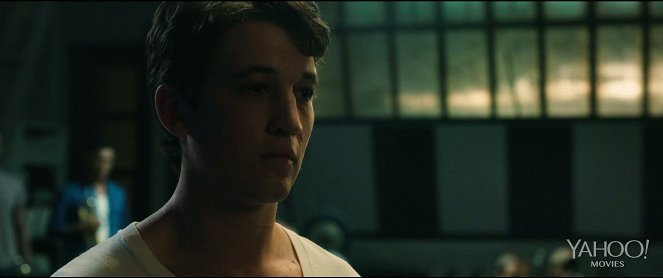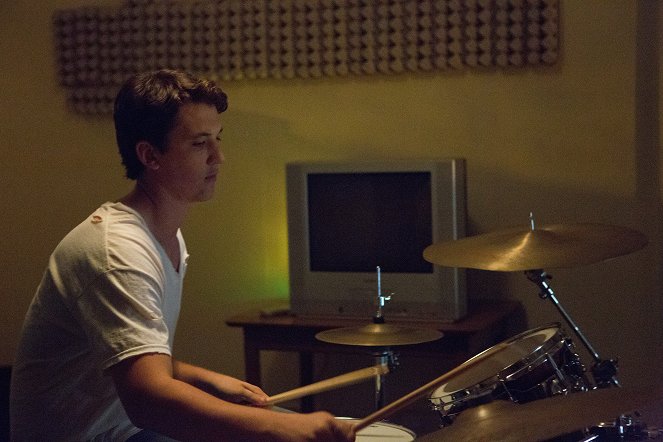Ohjaus:
Damien ChazelleKäsikirjoitus:
Damien ChazelleKuvaus:
Sharone MeirSävellys:
Justin HurwitzNäyttelijät:
Miles Teller, J.K. Simmons, Paul Reiser, Melissa Benoist, Austin Stowell, Nate Lang, Chris Mulkey, Damon Gupton, Max Kasch, Jayson Blair, April Grace (lisää)Suoratoistopalvelut (4)
Juonikuvaukset(1)
Andrew Neyman (Miles Teller) on kunnianhimoinen nuori jazz-rumpali, joka on vakaasti päättänyt nousta Yhdysvaltain itärannikolla sijaitsevan eliittikonservatorionsa huipulle. Isänsä epäonnistuneen kirjailijanuran varjostama Andrew janoaa tunnustusta taidoistaan. Terence Fletcher (J.K. Simmons) - soitonopettaja, joka on yhtä tunnettu pätevyydestään lahjakkuuksien koulijana kuin kammottavista opetusmenetelmistään - johtaa koulun parasta jazz-yhtyettä. Fletcher huomaa Andrewn kyvyt, siirtää nuoren muusikonalun omaan bändiinsä ja tulee samalla mullistaneeksi tämän elämän ikiajoiksi. Andrewn intohimoinen täydellisyyden tavoittelu muuttuu nopeasti pakkomielteeksi hänen armottoman opettajansa patistaessa häntä kykyjensä – ja lopulta hulluuden – rajamaille. (Walt Disney Nordic Fin.)
(lisää)Videot (5)
Arvostelut (14)
I don’t remember ever wanting to clap as hard during the end credits as I did this time. An excellent film, even though there is no one to root for and J.K. Simmons in particular portrays a monster only a tiny bit less scary than Anthony Hopkins’s character in The Silence of the Lambs. I wouldn’t be surprised if Whiplash wins Academy Awards for sound and editing, especially since it has no competition among music films with respect to sound.
()
A manipulative masterpiece. Actually, it has nobody to root for or to relate to – J.K.Simmons is almost a demonic caricature and Teller, with his drive to be the best of the best whatever the price, feels more like an unlikeable mule. But even with that, Whiplash is best enjoyed as an adrenaline ride where you can relish with how Teller hits those drums and Simmons screams and throws chairs at him. And then you don’t even notice those cheap crutches. 75 %
()
It never occurred to me that I would see such a great and well-made drama. This movie is also about music, but the focus lies on the story and the relationship between the two main protagonists. The young and talented Andrew, played in an exquisite way by Miles Teller, gets regular dressing down from the brutal conductor Terence Fletcher, who might be a bastard with the best catchphrases in this millennium. The comparison of J. K. Simmons’ role to those of other movie psychos, for example from Full Metal Jacket or Apocalypse Now, is really apt. You won’t believe until you watch this. And the hardest to believe will be the ending itself, which for me immediately became one of the most important and fundamental dramatic film endings I have ever seen. I stared at the screen and sweated for the actors. This was one of the most challenging films I've seen in a very long time... but it was worth it!
()
Spoilers ahead. Without psychologising and unnecessary plot digressions, Chazelle presents a chamber drama with the attributes of a psychological thriller whose rhythm is set by a confrontation between two very strong-willed sociopaths. The development of the narrative is as unpredictable as Fletcher’s teaching methods. As in jazz compositions, a brief release comes after the clashes escalate to the limit of a person’s physical capabilities and is soon followed by another dramatic crescendo. The way that Fletcher appears in a room, his predatory way of returning a gaze and the fact that we never see him in daylight are reminiscent of a monster from a horror movie. Under Fletcher’s influence, Andrew undergoes a transformation from a likable young man with big ambitions into a being that is as equally ruthless and indominable, a first-rate bastard, so to speak. While watching his development, we can ask whether extraordinary success must be preceded by submission and humiliation, the surrender of everything that makes us unique. In the end, Andrew may play without making mistakes, but he also plays without emotion or his own expressive feel. Does such music really represent the ideal self that he wanted to achieve? Chazelle doesn’t assert that it could be any other way in the competitive world of professional music. He doesn’t moralise or excuse the actions of either of the two main characters and, with the cynicism last demonstrated by Scorsese in The Wolf of Wall Street, he allows the two adversaries to devour each other. The film aptly references Rififi, which Andrew and his father go to see at the cinema. Like when committing a heist, there is no room for even a single ill-timed move when playing at the level Andrew desires. All parts of the body must be perfectly synchronized. It is not about the audience, but about the feeling of having full control over oneself and (essentially male) superiority over everyone else who fails to achieve the same level of precision. Like Fletcher and his obsession with tempo, Chazelle prides himself on flawless pacing. The film’s editing corresponds to the frantic drumming. The scenes set in the rehearsal room are precisely rhythmised according to Andrew’s drum hits and Fletcher’s assaults, thus transforming their (mostly) non-contact struggle into a brutal physical battle. The quick cuts between the close-ups of the musical instruments and the shots of body parts also create an effect evoking the merging of the musician with his instrument. Andrew literally lives his music. It characterises him and lends him a voice that can be heard. Therefore we hear it at the beginning before we even see the protagonist for the first time. The frenetic editing combined with the camera penetrating into the most intimate zone of the characters turns Whiplash into a very physical, horror-like experience. In a few places, the frontal assault on the senses has to be subordinated to the plausibility of the plot, into which several coincidences were not very artfully incorporated (the loss of the sheet music after Fletcher warns the musicians to guard it with their lives, the breakdown of the bus after Fletcher emphatically warns everyone to be on time for the concert). Due to the precedence of the visceral experience over probability and psychological motivations, this is not a drama of astonishing complexity, but I thoroughly enjoyed Whiplash as a thriller (on the big screen!). 80%
()
(vähemmän)
(lisää)
The film may push the despot-pupil relationship a little too much, but there’s no better demonstration in recent years that talent alone is not enough; that talent, not nourished by daily grind, immeasurable diligence, focus and a desire for maximalism, regardless of the obstacles, is actually useless. Because as J.K. Simmons says “There are no two words in the English language more harmful than ‘good job’.” Fuck "good job", geniuses must want more. The last time I experienced similar feelings was with the 1961 film The Hustler, with Paul Newman, which says the same thing about talent, though in a completely different industry. The message of this film is more or less clear and it doesn't matter if it is about drummers, violinists, billiard players or tennis players, its insight about Talent is universal.
()



Mainos